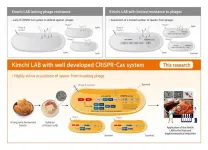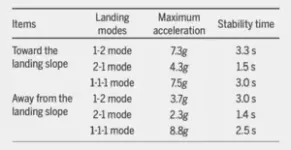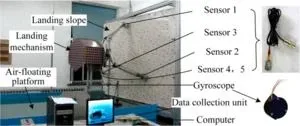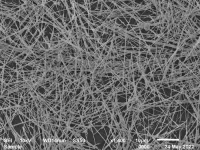(Press-News.org) Researchers at the World Institute of Kimchi have isolated lactic acid bacteria (LAB) strains with high levels of resistance to phages from kimchi fermented at low temperatures for a long period of time. They have also identified the defense mechanism of the LAB strains against phages, viruses that infect and replicate within bacteria.
Kimchi, a traditional Korean food, is a lactic acid-fermented vegetable product. Unlike fermented dairy products, which are produced under a sterilized-closed fermentation system, kimchi is produced through spontaneous fermentation initiated by various microorganisms present in the raw materials under a non-sterilized-open fermentation system. Thus, various LAB can be involved in kimchi fermentation, and the diversity of the dominant LAB and the periods during which they are dominant differ depending on the environment.
To identify the genetic traits of kimchi LAB in long-term fermented kimchi stored at low temperature, researchers at the World Institute of Kimchi collected 34 samples of kimchi fermented for more than 6 months at low temperatures of -2 to 10℃ from all over South Korea. In more than 88% of the collected kimchi samples, a specific LAB strain, Pediococcus inopinatus, was found to be the dominant species. Through whole-genome sequencing analysis, the researchers found that P. inopinatus has a very well-developed clustered regularly interspaced short palindromic repeat (CRISPR). CRISPR is a prokaryotic adaptive immune system composed of a combination of several genes depending on the LAB strain.
Specifically, the P. inopinatus strains possess additional copies of the csa3 gene, the gene coding for the transcription factors for the cas genes, compared to other LAB strains. Also, due to the active expression of cas genes, P. inopinatus strains store much more genetic information about phages. Therefore, after the first phage infection, P. inopinatus will be more effective in preventing subsequent infection with similar phage. The kimchi industry has been using kimchi LAB as a starter for the production of standardized kimchi with better sensory qualities. Just as humanity is threatened by the COVID-19 virus, these starters are also at risk of infection from phages. Therefore, the development of phage-resistant LAB strains is necessary. Additionally, among the kimchi LAB reported in this study, one LAB strain had a gene sequence that could play an immune role not only against phages but also against mammalian viruses.
Dr. Hae Choon Chang, President of the World Institute of Kimchi and the corresponding author of this study, said, “P. inopinatus possesses a unique, well-developed CRISPR system that can defend against a variety of viral invasions.” She also stated, “We are planning to study the antiviral activity and analyzing the immune spectrum of P. inopinatus, and we expect that the excellent antiviral ability of these kimchi LAB strains can be used not only in food but also in the pharmaceutical industry.”
The results of this study were published in the online edition of the September 2023 issue of Food Microbiology, an international journal dealing with all aspects of the microbiology of foods.
※ Paper title: Pediococcus inopinatus with a well-developed CRISPR-Cas system dominates in long-term fermented kimchi, Mukeunji (IF 5.3)
- Authors: (Corresponding author) Hae Choon Chang, PhD (first author) So Yeong Mun, PhD and Wooje Lee, PhD
END
Research team at World Institute of Kimchi discovers lactic acid bacteria strains with high virus resistance from kimchi
Identification of genetic traits of the kimchi lactic acid bacteria strains with strong virus defense
2023-11-01
ELSE PRESS RELEASES FROM THIS DATE:
CU Ophthalmology researcher funded to study Parkinson's disease biomarkers
2023-11-01
For some, the eyes are a window into the soul. But for Jayashree Kalpathy-Cramer, PhD, professor of ophthalmology at the University of Colorado School of Medicine, they're a window into human health.
The researcher was granted $300,000 by The Michael J. Fox Foundation this fall to analyze clinical data curated at the Sue Anschutz-Rodgers Eye Center using artificial intelligence (AI) in an effort to identify biomarkers of Parkinson’s disease, a progressive disorder that affects the nervous system and causes uncontrollable movements, such as shaking, throughout the body.
“This approach could be impactful ...
UTSA researchers develop energy-efficient AI with $2 million NSF grant
2023-11-01
Fidel Santamaria, a professor in the UTSA College of Sciences’ neuroscience, developmental and regenerative biology department, received a $2 million grant through the National Science Foundation’s Emerging Frontiers in Research and Innovation (EFRI) program to develop new artificial intelligence (AI) applications in the most energy-efficient manner yet.
For machine-learning tools to analyze new data, they must first sort data into various categories. For example, if a tool is sorting photos by color, then it needs to recognize which photos are red, yellow or blue to accurately classify them. While this is an easy chore for a human, the task presents a ...
The secret to enhancing consumer valuation and addressing the climate crisis at once: introduce circular take-back programs
2023-11-01
Researchers from Boston University published a Journal of Marketing study showing that tapping into consumers’ sense of ownership prompts them to place a higher value on products from a circular economy.
The study, forthcoming in the Journal of Marketing, is titled “Affording Disposal Control: The Effect of Circular Take-Back Programs on Psychological Ownership and Valuation” and is authored by Anna Tari and Remi Trudel.
Governments worldwide view a circular economy as part of the solution to the climate crisis. In the U.S., several states such as California, Connecticut, Maine, Oregon, and ...
Plastic-eating bacteria turn waste into useful starting materials for other products
2023-11-01
Mountains of used plastic bottles get thrown away every day, but microbes could potentially tackle this problem. Now, researchers in ACS Central Science report that they’ve developed a plastic-eating E. coli that can efficiently turn polyethylene terephthalate (PET) waste into adipic acid, which is used to make nylon materials, drugs and fragrances.
Previously, a team of researchers including Stephen Wallace engineered a strain of E. coli to transform the main component in old PET bottles, terephthalic acid, into something tastier and ...
Younger Middle Eastern patients with new acute coronary syndrome more likely to smoke, have high cholesterol
2023-11-01
Young patients from the Middle East and Gulf region presenting with acute coronary syndrome have a greater prevalence of risk factors, including smoking and high cholesterol compared to older patients also presenting with first acute coronary syndrome. The study, presented at the American College of Cardiology Middle East & Eastern Mediterranean 2023 conference, found these patients still had similar outcomes compared to older patients.
Acute coronary syndrome (ACS) describes a variety of cardiovascular conditions related to sudden reduction in blood flow to the heart, including heart attack and unstable angina ...
Reducing breast cancer disparities in Delaware: 'Getting the village back together'
2023-11-01
There’s a tried and proven pathway to reducing racial disparities in cancer in Delaware. It worked with colon cancer 10 years ago and should now be applied to the incidence of breast cancer in the state. That's the recommendation of clinicians, program leaders and researchers from the ChristianaCare Helen F. Graham Cancer Center & Research Institute in a new commentary published in Population Health Management on Nov. 1, 2023.
The commentary — "Reducing Racial Disparities in Breast Cancer: Getting the ...
New research links high salt consumption to risk of Type 2 diabetes
2023-11-01
Those at risk for Type 2 diabetes may already know to avoid sugar, but new research suggests they may want to skip the salt as well.
A new study from Tulane University published in Mayo Clinic Proceedings found that frequently adding salt to foods was associated with an increased risk of developing Type 2 diabetes.
The study surveyed more than 400,000 adults registered in the UK Biobank about their salt intake. Over a median of 11.8 years of follow-up, more than 13,000 cases of Type 2 diabetes developed among participants. Compared ...
New resource gives business leaders a blueprint for optimizing equitable employee health and well-being
2023-11-01
DALLAS, November 1, 2023 — Health outcomes research has shown that workers in the U.S. experience inequitable health and well-being, with significant variations in the burden of chronic disease, mental health conditions, food insecurity and more across populations, even among those covered by employer-sponsored insurance.[1], [2] Recent studies demonstrate how the workplace can serve as a social driver of health, impacting the risk of conditions such as high blood pressure and heart disease.[3], [4] This growing ...
Nanowire ‘brain’ network learns and remembers ‘on the fly’
2023-11-01
For the first time, a physical neural network has successfully been shown to learn and remember ‘on the fly’, in a way inspired by and similar to how the brain’s neurons work.
The result opens a pathway for developing efficient and low-energy machine intelligence for more complex, real-world learning and memory tasks.
Published today in Nature Communications, the research is a collaboration between scientists at the University of Sydney and University of California at Los Angeles.
Lead ...
Epigenetic signature for obesity found in study of twins
2023-11-01
PULLMAN, Wash. – A susceptibility to gain weight may be written into molecular processes of human cells, a Washington State University study indicates.
The proof-of-concept study with a set of 22 twins found an epigenetic signature in buccal or cheek cells appearing only for the twins who were obese compared to their thinner siblings. With more research, the findings could lead to a simple cheek swab test for an obesity biomarker and enable earlier prevention methods for a condition that effects 50% of U.S. adults, the researchers said.
“Obesity appears to be more complex than simple consumption of food. Our work indicates there’s a susceptibility for this disease ...
LAST 30 PRESS RELEASES:
Cost of copper must rise double to meet basic copper needs
A gel for wounds that won’t heal
Iron, carbon, and the art of toxic cleanup
Organic soil amendments work together to help sandy soils hold water longer, study finds
Hidden carbon in mangrove soils may play a larger role in climate regulation than previously thought
Weight-loss wonder pills prompt scrutiny of key ingredient
Nonprofit leader Diane Dodge to receive 2026 Penn Nursing Renfield Foundation Award for Global Women’s Health
Maternal smoking during pregnancy may be linked to higher blood pressure in children, NIH study finds
New Lund model aims to shorten the path to life-saving cell and gene therapies
Researchers create ultra-stretchable, liquid-repellent materials via laser ablation
Combining AI with OCT shows potential for detecting lipid-rich plaques in coronary arteries
SeaCast revolutionizes Mediterranean Sea forecasting with AI-powered speed and accuracy
JMIR Publications’ JMIR Bioinformatics and Biotechnology invites submissions on Bridging Data, AI, and Innovation to Transform Health
Honey bees navigate more precisely than previously thought
Air pollution may directly contribute to Alzheimer’s disease
Study finds early imaging after pediatric UTIs may do more harm than good
UC San Diego Health joins national research for maternal-fetal care
New biomarker predicts chemotherapy response in triple-negative breast cancer
Treatment algorithms featured in Brain Trauma Foundation’s update of guidelines for care of patients with penetrating traumatic brain injury
Over 40% of musicians experience tinnitus; hearing loss and hyperacusis also significantly elevated
Artificial intelligence predicts colorectal cancer risk in ulcerative colitis patients
Mayo Clinic installs first magnetic nanoparticle hyperthermia system for cancer research in the US
Calibr-Skaggs and Kainomyx launch collaboration to pioneer novel malaria treatments
JAX-NYSCF Collaborative and GSK announce collaboration to advance translational models for neurodegenerative disease research
Classifying pediatric brain tumors by liquid biopsy using artificial intelligence
Insilico Medicine initiates AI driven collaboration with leading global cancer center to identify novel targets for gastroesophageal cancers
Immunotherapy plus chemotherapy before surgery shows promise for pancreatic cancer
A “smart fluid” you can reconfigure with temperature
New research suggests myopia is driven by how we use our eyes indoors
Scientists develop first-of-its-kind antibody to block Epstein Barr virus
[Press-News.org] Research team at World Institute of Kimchi discovers lactic acid bacteria strains with high virus resistance from kimchiIdentification of genetic traits of the kimchi lactic acid bacteria strains with strong virus defense






